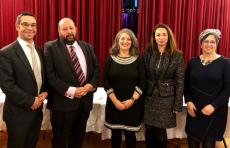Good parenting featuring conversation rather than confrontation was the key to avoiding friction with teenagers taxed with spending too much time gazing at screens. This was one of the solutions put forward by a panel which included the heads of two leading Jewish secondary schools, a family psychotherapist and the chief executive of Jewish Interactive, an organisation that creates Jewish educational resources for smartphones and tablets, when they joined an audience of around 90 concerned parents, grandparents and youngsters at St Albans United Synagogue (January 10, 2019) to watch the American documentary film, "Screenagers". The award-winning film, sub-titled "Growing Up in the Digital Age", explores the impact of screen use – smartphones, social media, video games, the internet and more – on young people, a topic once again hitting world-wide headlines.
Following the showing of the 60-minute film, audience members were invited to question the panel – Spencer Lewis, head of Borehamwood-based Yavneh College, Rachel Fink, head of JFS, Kingsbury, Simon Shattock, who, as well as practising as a family psychotherapist, is also a senior lecturer at the Institute of Family Therapy, and Chana Kanzen, a former head of Jewish Studies at Morasha Jewish Primary School before helping to set up Jewish Interactive in 2013.
The debate that ensued, moderated by St Albans chair Elissa Da Costa-Waldman, ranged over the many challenges facing young people, including cyber-bullying. And while the Yavneh head felt that schools could not and should not take the place of parents in talking to children about the ramifications of putting things on line, Mrs Fink from JFS thought that schools had a responsibility to resolve the situation. “Every child has the right to feel safe at school,” she added.
All the panel members agreed, however, that it was important to establish rules and boundaries for screen use –at an earlier age that might once have been thought appropriate – and monitor usage. According to Mr Lewis, keeping Shabbat was an effective way of establishing self-discipline. “The concept of maintaining 25 hours a week where children are unable to use their phone really does work”, he said.
Other useful tips for defusing the all-too frequent arguments were offered by Mrs Kanzen, who also maintained the need for familiarity with the use of digital devices and programmes. “If we don’t expose our children to technology thus giving them the skills they require in the current workplace, they will not get a job. It is important to accept that technology is in our lives.”
A notable feature of the debate was the vociferous defence by several of the Yavneh College pupils present of the technology that is part and parcel of their world. Commented an audience member: “These kids were so eloquent and articulate; if that’s where screen use leads them, it can’t be doing them too much harm!”
Photos show: 1 & 2) Panellists at the St Albans showing of 'Screenagers': left to right: Yavneh head Spencer Lewis, psychotherapist Simon Shattock, St Albans United chair and debate moderator, Elissa Da Costa-Waldman, JFS head Rachel Fink, and Jewish Interactive chief executive, Chana Kanzen.
3) (Left to right) St Albans United Synagogue minister Rabbi Daniel Sturgess) with panellists at the St Albans showing of ‘Screenagers’: Yavneh head Spencer Lewis, St Albans United chair and debate moderator, Elissa Da Costa-Waldman, JFS head Rachel Fink, and Jewish Interactive chief executive, Chana Kanzen.
by Jay Grenby, Press Officer, St Albans United Synagogue


